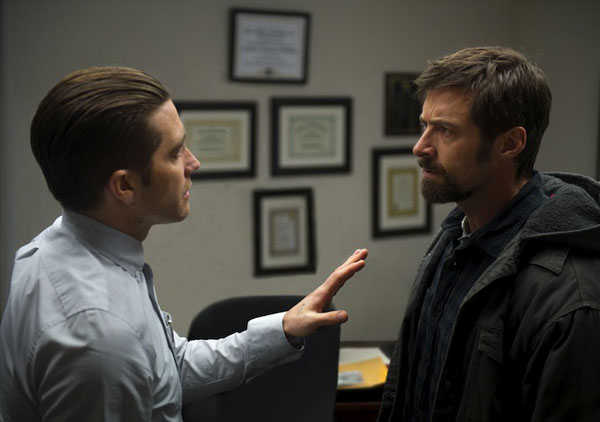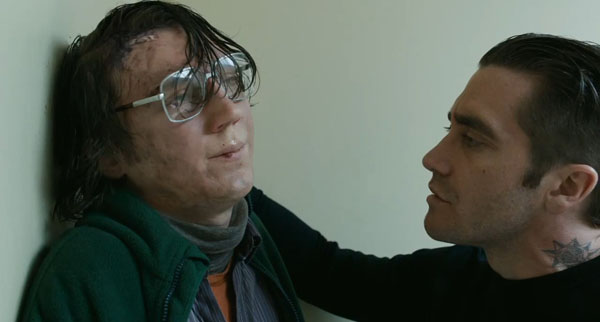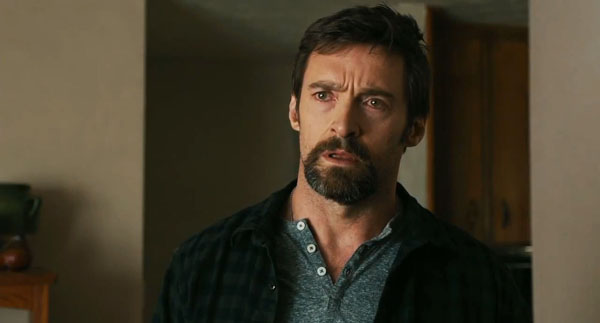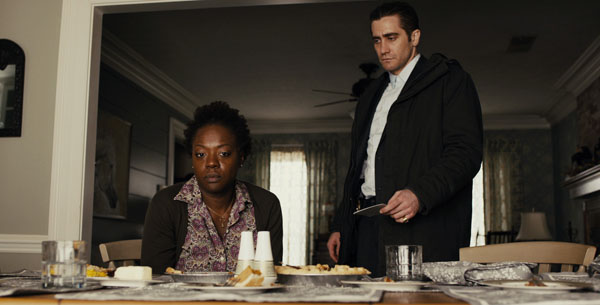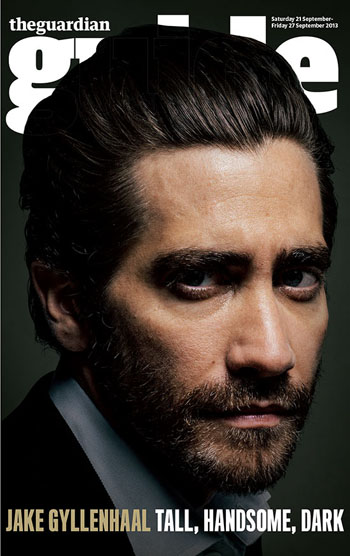“The wages of sin, guilt, vengeance and redemption weigh heavy on the characters of Prisoners, a spellbinding, sensationally effective thriller with a complex moral center that marks a grand-slam English-lingo debut for the gifted Quebecois director Denis Villeneuve,” trumpets Variety‘s Scott Foundas. “Powered by an unusually rich, twisty script by Aaron Guzikowski (Contraband) and career-best performances from Hugh Jackman and Jake Gyllenhaal, this tale of two Pennsylvania families searching for their kidnapped daughters sustains an almost unbearable tension for two-and-a-half hours of screen time, satisfying as both a high-end genre exercise and a searing adult drama of the sort Hollywood almost never makes anymore.”
“Closest in terms of precedents to the patiently told crime sagas of David Fincher, with shades of Se7en and explicit nods to Zodiac, Prisoners alternates between two modes: an investigative thriller and a intense tale of crime and punishment.” Indiewire‘s Eric Kohn finds it “easy to make peace with some of the obvious genre tropes and simply admire the precision with which Villeneuve keeps the pace in constant forward motion.”
“Already boasting a Foreign-Language Oscar nomination for Incendies and a string of strong independent features, Villeneuve continues to prove his deeply confident footing,” writes Rodrigo Perez at the Playlist. Villeneuve brings “intelligence and muscular and mannered nuance to a somber and extremely tense studio drama that doesn’t deign to ever spell things out (the ending is probably the most bold studio finale we’ve seen in ages and seemed to even puzzle some). His precision and control over tone, pitch and mood—much of which is gripping and portentous—is immaculate.” And “cinematographer Roger Deakins (True Grit, Skyfall) steals the show with some breathtakingly layered compositions and the disquieting atmospheres he drapes around the picture.”
“The editing by Joel Cox and Gary D. Roach, two editors of many of Clint Eastwood’s recent movies, is also first-rate,” adds Stephen Farber in the Hollywood Reporter. “Although the film runs two and a half hours, there doesn’t seem to be a wasted frame.”
One more note for the moment from Kristopher Tapley at In Contention: “The narrative, in a nutshell, was set up nicely by a trailer many think gives away too much, but trust me when I say it doesn’t. It’s the story of a pair of kidnapped girls and the labyrinthine hunt for where they are, who took them and why. The answers ultimately aren’t all that satisfying, to be perfectly honest, but the build to them, the craft on display and a hugely brave final moment make it easy enough to look past narrative contrivances.”
Having premiered in Telluride, Prisoners will be a Special Presentation in Toronto.
Updates, 9/5: “People throw around the term ‘edge of your seat’ a lot when it comes to movies with a bit of a faster pulse, but Prisoners is different,” writes Erik Davis at Movies.com. “It’s an emotionally intense edge-of-your-seat thrillride that won’t let go of your mind, body and soul until the title card appears in the end credits.”
John Hazelton for Screen Daily: Villeneuve “lets the tension build slowly and organically, using most of his screen time to look at how the relationships—between Keller, Loki, Alex, Keller’s wife (played by Mario Bello), the other child’s parents (Terrence Howard and The Help’s Viola Davis) and Alex’s mother (Melissa Leo)—change as the clock ticks on the search for the missing girls. The mood of foreboding is enhanced by the film’s muted color palette and cinematographer Roger Deakins’s use of digital cameras and natural light.”
Updates, 9/7: Prisoners “is both better than you might imagine—in a doolally sort of way—and more trivial, for all its smog-like aura of utter, unremitting despair,” writes the Telegraph‘s Tim Robey. “The last, convoluted hour is an Emmental of plot holes and practically random thriller signifiers—cases of snakes, child mannequins, scribbled maps of insoluble mazes. You wonder if the whole torture-based morality play idea struck everyone as commercially dubious, and the decision was made to go for broke.”
But for Paul MacInnes, writing for the Guardian, Prisoners is “a masterful thriller that is also an engrossing study of a smalltown America battered by recession, fear and the unrelenting elements…. There is a feeling of a community clinging on by its fingertips, not just in coming to terms with a terrible crime but in making ends meet at all. This is perhaps Villeneuve’s greatest achievement.”
William Goss at Film.com, where Calum Marsh interviews Villeneuve: “Few modern thrillers aim to engage an adult audience first and foremost, and fewer still concern themselves with weighty moral dilemmas while unfolding their mysteries at a deliberate pace (the film runs nearly 150 minutes and hardly feels as such). Even if Prisoners doesn’t pack quite the same punch as either Ben Affleck’s great Gone Baby Gone or upcoming Israeli import Big Bad Wolves, it certainly follows well enough in their bleak, taut footsteps.”
Update, 9/8: “Prisoners is concerned with the relationship between ends and means, but not too deeply,” writes A.A. Dowd at the AV Club. “It’s predominately a crackerjack mystery yarn, one that grows increasingly farfetched as it progresses but never quite loses its darkly magnetic pull.”
Update, 9/11: Nigel M. Smith interviews Villeneuve for Indiewire.
Update, 9/12: The Boston Globe‘s Ty Burr: “Fun? Hardly. Predictable? Here and there. But I was never bored in 146 minutes, and that’s saying something.”
Update, 9/14: At Twitch, Ryland Aldrich is “confronted with too many nagging story issues to give it a pass.”
Updates, 9/17: “Prisoners may be the year’s most immaculate-looking drivel, a prismatically shot whodunit abundant in red herrings, but lacking in moral contemplation,” writes Ed Gonzalez in Slant. “Denis Villeneuve, similar to Roman Polanski, has an uncanny gift for composition, crafting his images from off-kilter angles that convey an unmistakable tension, so that an innocuous conversation between two men seethes with the same level of menace as the pounding of little hands against the walls of a mysterious recreational vehicle that may or may not be driven by the story’s boogeyman. But unlike his magisterial Polytechnique, which blisteringly and unnervingly communicated a modern-mythic sense of man’s almost existential alienation from women via a purposefully flamboyant aesthetic, the Quebecois filmmaker’s first English-language production is no more, no less than a lavishly staged funeral procession, and its effect is borderline pornographic.”
“Most detective stories drive toward reassurance,” writes David Denby in the New Yorker. “A detective uses his reason, his specialized knowledge of how criminals think, and gradually, after many mistakes, solves the crime, exposes the corruption, and pulls the pieces of our existence back into a satisfying whole…. Villeneuve has what I keep looking for in directors: a charged sense of the way the world actually works. Dover, similar to the Sean Penn character in Mystic River—a man who loses his daughter and goes mad—falls into moral anarchy. His job in life, he keeps saying, is to protect his family. He’s morally right and also disastrously wrong.”
“Villeneuve is trying like hell to elevate what turns out to be a dumb genre picture,” writes New York‘s David Edelstein. “Viola Davis has a crazily nuanced scene when she regards the imprisoned man for the first time, and that chameleon Melissa Leo provides a few frissons in creepy-neutral mode as Alex’s aunt. But Prisoners is a long sentence. The detective moves in slow motion, and you can’t tell if it’s because the pacing and structure are faulty or if it’s the filmmaker’s way of making you think, In the real world, there is no instant gratification. But in the real world there wouldn’t be a red herring as dumb as the one here.”
Updates, 9/19: “Prisoners is an effectively moody child-abduction potboiler that spends much of its two and a half hour running time threatening to become some sort of allegory,” writes Ignatiy Vishnevetsky at the AV Club; “however, its religious themes and War On Terror imagery prove to be red herrings, and while the movie is certainly less than the sum of its referents, it nonetheless works as a formally controlled genre piece.”
“The uniformly showy performances (Acting with a capital ‘A’) are what do in Prisoners more than anything,” finds Time Out New York‘s Keith Uhlich. “The film has several adeptly directed suspense scenes, such as a nighttime foot chase that makes you gasp at every motion-triggered backyard light, but for all the expertly realized atmosphere, you never sense that any of the players is inhabiting a character. Instead they seem to be dispiritedly reading lines off of an internal teleprompter, lending a mock-sense of gravity to a story whose increasingly risible signs and portents (from snakes in a box to a Lazarus-like cave that figures in a head-slappingly ‘ambiguous’ finale) play like bloated insta-metaphors bolstering a dour, mostly tension-free enterprise.”
“Prisoners is no Taken, with its roller coaster of Liam Neeson looking for a kidnapped daughter,” writes Ray Pride at Newcity Film, “it’s not Saw, with torture victims kept in captivity, but it does partake of story elements familiar from those and other exploitatively themed pictures. It’s Taken, taken seriously, but also Saw, seen from an ordinary man’s protective impulses.”
More from Jason Bailey (Flavorwire), Bilge Ebiri (Nashville Scene), Noel Murray (Dissolve), and Jonathan Romney (Film Comment). And for the New York Times, Villeneuve walks us through a scene (2’46”).
Updates, 9/21: “As a thriller and an investigation into the morality of vengeance, Prisoners is seriously flawed,” writes Nick Schager for Esquire. “Yet there’s something it is gut-wrenchingly good at: stoking the primal fear born from imagining children in peril…. Can such scenarios be cheap? Sure. Can they be sleazy? Definitely. Can they be effective? Undeniably.” And Prisoners “is all three of those things.”
More from Richard Corliss (Time), Andrea Gronvall (Chicago Reader), Sheila O’Malley (RogerEbert.com), and Christopher Orr (Atlantic).
And Paul MacInnes profiles Gyllenhaal for the Guardian.
Update, 9/22: Prisoners “locked up the weekend box office title in the United States and Canada, grabbing $21.4 million in ticket sales during its first three days in theaters,” Reuters reports.
Update, 9/27: “Prisoners is hideous, cruel, degrading, depressing, relentless, prolonged, humorless, claustrophobic, and a mockery of any surviving tradition in which films are entertaining,” writes David Thomson in the New Republic. “And 153 minutes.”
And Michael Nordine, writing for Cinema Scope, finds it “strange that, for a film with more than one outwardly religious character…, there’s almost no thought given to the moral weight behind a single action carried out over the film’s 153 minutes…. Sadly absent from all this is the evocatively impressionistic approach that Villeneuve brought to Polytechnique (2009), whose fragmented depiction of the 1989 École Polytechnique massacre in Montréal raises more disturbing questions about the nature of violence in 75 minutes than Prisoners does in more than twice the running time.”
2013 Indexes: Telluride and Toronto. For news and tips throughout the day every day, follow @KeyframeDaily on Twitter and/or the RSS feed. Get Keyframe Daily in your inbox by signing in at fandor.com/daily.

